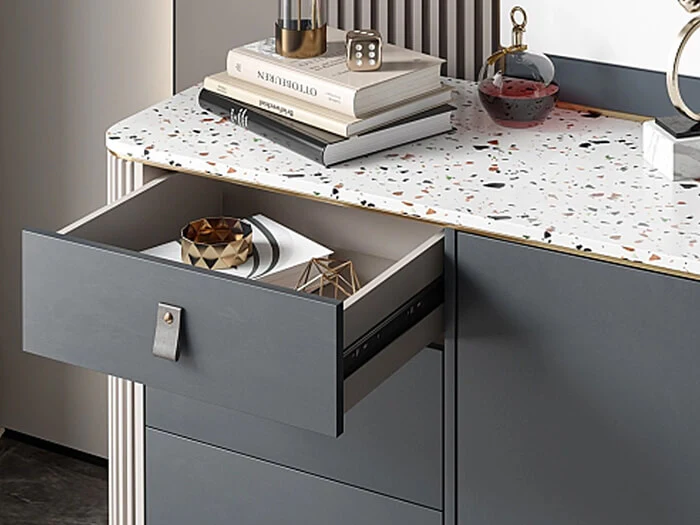Even while drawer slides seem like a simple part of cabinetry, choosing the appropriate ones may have a big impact on your furniture’s appearance and functionality. Whether you’re designing a new kitchen, upgrading your office storage, or building custom furniture pieces, understanding the types, features, and considerations of drawer slides is essential. The goal of this in-depth tutorial is to provide you with the information you need to choose drawer slides with confidence.
Recognising Drawer Slides
Drawer slides, also known as drawer glides or runners, are mechanisms that facilitate the smooth opening and closing of drawers. They provide support and ensure stability, allowing drawers to operate seamlessly. Drawer slides are typically composed of two main components:
- Drawer Member (Or Slide): Attached to the sides of the drawer box.
- Cabinet Member (Or Track): Installed inside the cabinet carcass or frame.
These components work together to guide the drawer as it is pulled out and pushed back in. Drawer slides come in various materials, configurations, and weight capacities, catering to different needs and applications.
Types Of Drawer Slides
1. Side-Mount Drawer Slides
Side-mount drawer slides are among the most common types and are installed on the sides of the drawer and inside the cabinet. They are versatile and support different drawer widths and depths. Side-mount slides are available in full-extension, partial-extension, and over-travel configurations, allowing drawers to extend fully or beyond the cabinet frame for easy access.
2. Undermount Drawer Slides
Undermount slides are concealed beneath the drawer and attached to the sides. They provide a sleek, clean look to cabinetry by hiding the hardware. Undermount slides are popular for modern kitchens and furniture where aesthetics are a priority. They often feature soft-close mechanisms for smooth and quiet operation.
3. Center-Mount Drawer Slides
Less common today, centre-mount slides are mounted centrally under the drawer. They require precise alignment and are suitable for lighter loads due to their design. Centre-mount slides are often used in antique furniture restoration or where side space is limited.
4. European Drawer Slides
Also known as bottom-mount or centre-guided drawer slides, European slides are attached to the bottom of the drawer box and the cabinet’s bottom edge. They are common in frameless cabinetry and are easy to install. European slides support medium to heavy loads and provide stable operation.
5. Heavy-Duty Drawer Slides
Designed for large or heavy drawers, heavy-duty slides offer higher weight capacities and durability. They are used in industrial applications, tool chests, and pantry pull-outs where robustness is crucial. Heavy-duty slides come in various lengths and configurations to accommodate specific load requirements.
Factors To Consider When Choosing Drawer Slides
To make sure the drawer slides you choose will fulfil your unique needs, it is important to take into account a number of important factors:
1. Drawer Size And Weight Capacity
Consider the dimensions and weight of your drawers. Drawer slides are rated for different weight capacities, ranging from lightweight slides for kitchen utensil drawers to heavy-duty slides for file cabinets or storage units. Ensure the slides you choose can support the intended load without compromising performance.
2. Extension Type
Decide on the extension type based on how much access you need to the drawer contents:
- Full Extension: Allows the drawer to fully extend beyond the cabinet, providing complete access to the contents.
- Partial Extension: Offers limited access as the drawer only partially extends.
- Over-Travel: Extends beyond full extension, providing additional access to the rear of the drawer.
Choose the extension type that best suits your functional requirements and space constraints.
3. Mounting Style
Consider the mounting style that aligns with your cabinet design and aesthetic preferences:
- Side-Mount: Visible on the sides of the drawer and cabinet.
- Undermount: Concealed beneath the drawer, offering a sleek appearance.
- Bottom-Mount (European): Attached to the bottom edge of the drawer and cabinet.
Each mounting style offers distinct advantages in terms of functionality and appearance.
4. Soft-Close Mechanism
Soft-close drawer slides feature integrated dampers that control the speed and force of drawer closure, preventing slamming. This feature enhances safety, reduces noise, and prolongs the life of both the drawer and slide mechanisms. Consider incorporating soft-close slides for added convenience and comfort.
5. Material And Finish
Drawer slides are available in various materials, such as steel, aluminium, and plastic. The material affects durability, smoothness of operation, and resistance to corrosion. Choose a material that suits your environmental conditions and aesthetic preferences. Additionally, consider the finish of the slides to complement your cabinetry style.
6. Installation Ease
Evaluate the installation requirements of the drawer slides. Some slides come with adjustable mounting brackets or quick-release mechanisms for easier installation and maintenance. Ensure the slides align with your skill level and tools available for installation.
7. Budget Considerations
Drawer slides vary in price based on material, features, and brand. Establish a budget that balances your desired features with cost considerations. High-quality slides may incur a higher initial cost but offer long-term reliability and performance.
Conclusion
Selecting the appropriate drawer slides requires knowing your needs and weighing a number of variables, including type, weight capacity, extension type, mounting method, and extra features. You may improve the furniture’s or cabinets’ longevity, visual attractiveness, and use by choosing the right drawer slides. Whether you prioritise smooth operation, sleek design, or heavy-duty performance, the right Selectlok drawer slides will contribute to a satisfying and efficient user experience.
Keep an eye for more latest news & updates on The Home Info!



